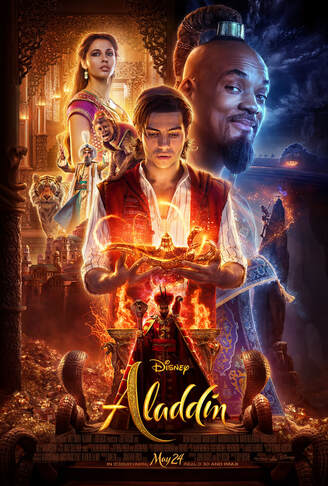 Movie poster (Disney)
Movie poster (Disney) One by one, Disney’s given live-action makeovers to their classic films, and 1992’s Aladdin is the latest to get that treatment. Each adaptation announcement stirs up excitement from audiences, but there’s also an anxiety and skepticism that expectations won’t be met. When it comes to remakes, viewers tend to look for three things: 1) nostalgia, 2) improved story-telling, and 3) application of today’s technology and/or cultural atmosphere. The 2019 edition of Aladdin (directed by Guy Ritchie; screenplay by Ritchie and John August) fulfills all three criteria a medium amount. That said, you’ll likely leave the theater content, but it’s equally likely there’ll be an undercurrent of disappointment.
Not that you’ll need this plot summary, but just for good measure: Aladdin (Mena Massoud) is an impoverished young man, whose life turns around when he finds a mystical lamp that inhabits a Genie (Will Smith). He’s allotted three wishes. He hopes to woo his city’s (the fictitious Arabian Agrabah’s) Princess Jasmine (Naomi Scott), who has her own problems. She’s regularly monitored by palace guards, and is being made to marry to retain her sovereign status. Meanwhile Jafar (Marwan Kenzari), her father’s right hand man, is secretly determined to reign.
Misguided casting is often the first thing to threaten a recreation project. In this case, the characterizations of the fictional alter egos were the trouble. Many Disney tales include talking animal friends with splashy personalities. They carry the humor and compliment their human companions. They’re usually positioned peripherally, but they’re essential. In Aladdin, these pet pals were the petulant and mischievous monkey Abu, and the devious and obnoxiously loud parrot Iago. Part of the thrill of a live-action rendering is seeing fantasy elements (like a mouthy monkey) become tangible. Ritchie squandered the opportunity for this. He and his team heavily focused on aesthetic realism, sucking the pizzazz out of Abu and Iago. There was a similar effect in 2017's Beauty & The Beast (you can read my review here).
Royal vizier Jafar is an antagonist in name only. His presentation is entirely too subtle, having none of the menacing or magnetic qualities of his cartoon predecessor. When I was younger, I had nightmares about Jafar for years. Kids now are more liable to be scared of Santa Claus than Kenzari’s copy. The character’s allure lies within his shady wit. He does things like deliberately mispronounce Aladdin’s name, and use the guy’s signature song (i.e. “Prince Ali”) to expose and humiliate him. You wonder if Kenzari's’s incarnation is even capable of making a chicken joke.
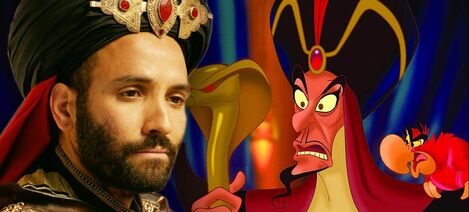 Kenzari's lifeless Jafar is no match for the witty & bone-chilling cartoon version (Disney)
Kenzari's lifeless Jafar is no match for the witty & bone-chilling cartoon version (Disney) Aladdin himself is still effervescent and charming, but he’s much less interesting than the Genie and Princess Jasmine. You almost forget about the dude.
Jasmine is the only one whose alterations were an overwhelming upgrade. In the 1992 original, she’s dainty, naive and just mildly assertive. She’s most concerned with being able to socialize outside the palace walls, and choose her own suitor. In Ritchie’s picture, the princess is an astute and formidable force to be reckoned with. Her aspirations are bigger too. She questions why she has to marry in order to inherit her father’s kingdom, when she can just be sultan herself. She seeks to vanquish the sexist and elitist political structures that silence Agrabah’s women and poor. Moreover, she wishes to break the barriers between the royals and the civilians. This is the most noticeable call to present events. Gender equality, social class and governmental standards have always been hot topics, but especially now.
If animated-Jasmine did nothing else, it was deliver a line that would go on to deemed iconic by a generation of females. There’s a scene where she storms in on a conversation between her father, Jafar and Aladdin about her marital status. She yells, “How dare you! All of you! Standing around deciding my future?! I am not a prize to be won!” My grade-school self was impelled and I took a mental note. I unfortunately had use for the quote many times as I aged; the last sentence in particular. Having to iterate your agency and personhood is sadly a component of the female experience.
Hearing Scott recite “I am not a prize to be won!” was in the top five things I was looking forward to when I bought my movie ticket. So, imagine how let down and dismayed I felt when the moment didn’t come. I wasn’t alone in my emotions. Some women tweeted that the quote’s exclusion was Aladdin’s singular and/or largest flaw. Adding insult to injury, the phrase was seemingly replaced. Aladdin nervously flubs his words offering lavish gifts to the Sultan, and infers he’s “buying” the princess. She rhetorically asks if he thinks she can be purchased, and walks off unimpressed. Given the delivery of the dialogue, and the scene’s context and tone, the 'replacement' wasn’t nearly as impactful. Why revise the line in the first place? It resonated so strongly in the 90’s, even with Jasmine being quite delicate. Think of how inspirited today’s girls would be, hearing the emboldened version of the princess say that phrase.
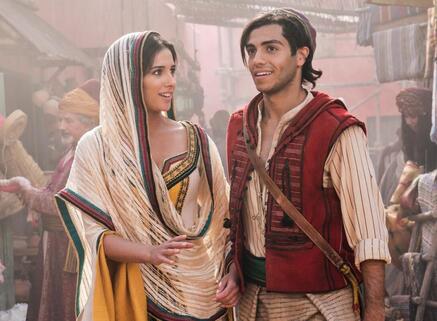 Aladdin (Massoud) & Jasmine (Scott) meet for the first time (Disney)
Aladdin (Massoud) & Jasmine (Scott) meet for the first time (Disney) These omissions were purposeless, as they did nothing to enhance the story. They debatably created voids. Some of Ritchie’s other changes helped with pacing and character depth. An example is Jafar’s added backstory, explaining his power-hungriness. Ritchie and August write that Jafar was once a 'street rat' like Aladdin, but he climbed his way up the social ranks. Still, he was put in submissive roles and was told to “know his place.” He operates out of resentment and an inferiority complex. The psychology is intriguing, but Jafar’s aforementioned dryness is a distraction from that.
The adjustments made to the movie’s soundtrack were less deflating. Shots of hip-hop fit right in with the up-tempo tracks (ex. “Prince Ali”). Acoustic guitars gave a pop-rock edge to tunes like “One Jump.” Generally, these attempts to musically appeal to contemporary audiences weren’t overbearing or contrived. The ‘modernizing’ of “A Whole New World” is an exception. It should’ve stayed orchestral. The guitar-based and rhythmic infusions took away from song’s symphonic beauty. Benj Pasek and Justin Paul (of The Greatest Showman and La La Land fame) penned the new “Speechless,” which serves as an ode of defiance for Jasmine. Scott manages it well, but her voice goes shrill in the upper echelons. The rest of the cast’s ‘bare minimum’ vocal performances make it evident that they aren’t singers by trade.
Perhaps by now you can understand why I said Aladdin 2019 moderately met the unwritten ‘remake requirements.’ Ritchie and August’s plot/script edits advanced some areas, but diminished or overlooked others. Consequently, the nostalgia level was affected. The application of today’s cultural atmosphere wasn’t thorough, but it was done where it counted (i.e. Jasmine’s feminism and the social system commentary). As far as the application of ‘state of the art’ technology, it’s indisputable that Ritchie didn’t use the resources at his disposal to their full potential. On my way home from the theater, I thought, “Who was this movie made for?” It definitely wasn’t children, as many of the fun and waggish things that would cater to them were removed (in fact, I don’t recall hearing a single munchkin giggle or yelp with elation). It wasn’t for adults in search of ‘throwback feels,’ because some of their favorite parts were absent. It couldn’t be that adults completely unfamiliar with Aladdin were the target demographic, because that would be sorely illogical marketing. This lends to the conclusion that Disney’s mindset was “Let’s just attract folks with the concept alone, get these box office numbers, and call it a day.”
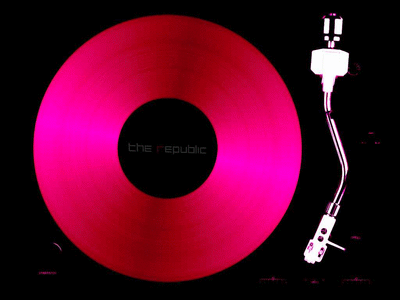
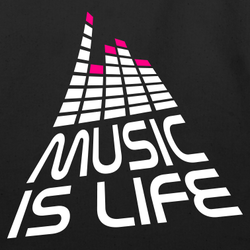
 RSS Feed
RSS Feed